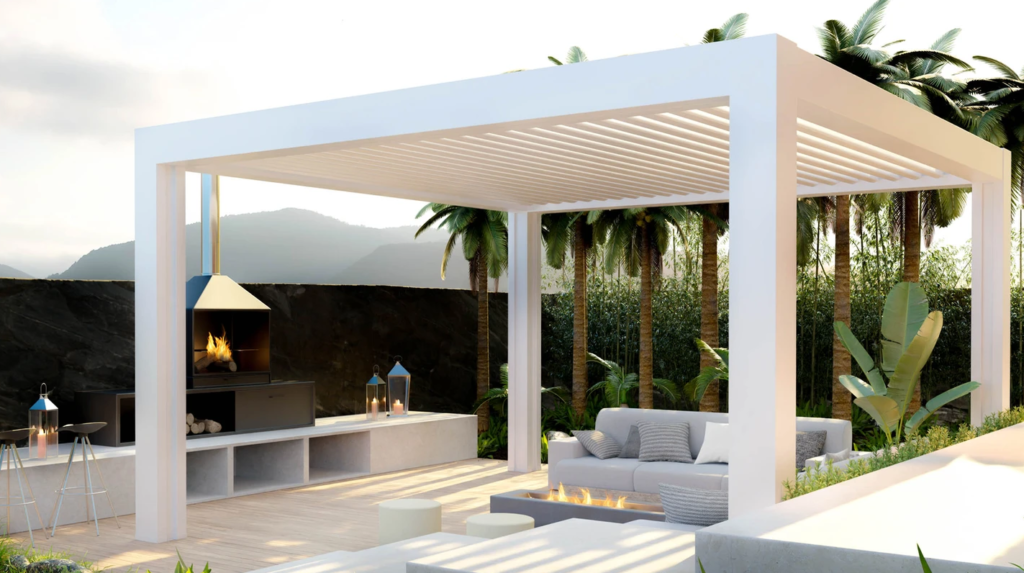When it comes to outdoor relaxation spaces, the classic debate often begins here: aluminum gazebos versus steel gazebos. Both appear sturdy and durable, and both provide shade and protection from the wind, but which one is more suitable for your backyard?
What is an Aluminum Pergola?
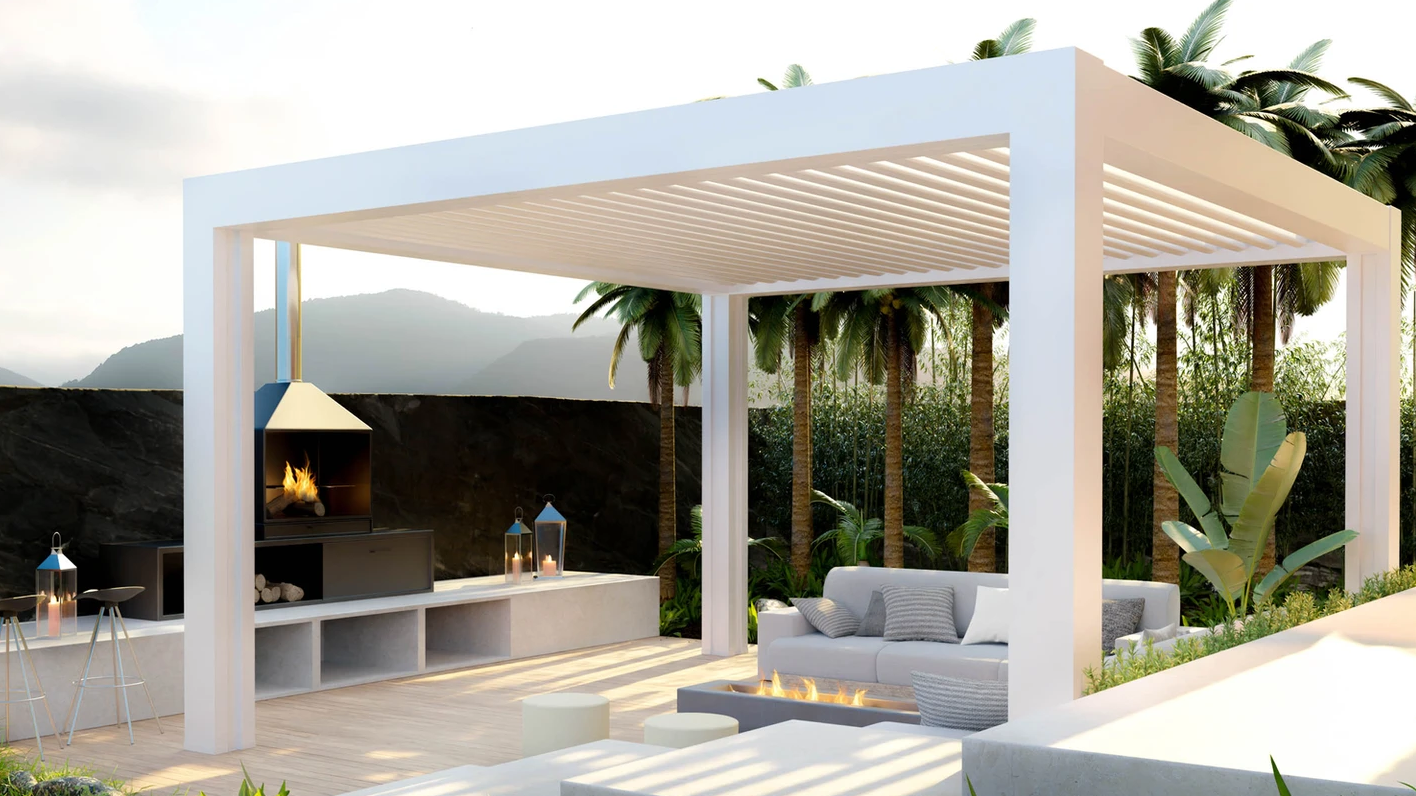
Aluminum pergolas are known for their clean lines, simple maintenance, and excellent weather resistance. They don’t rust, they don’t demand constant attention, and they can stay looking sharp with just an occasional rinse.
Features:
- Lightweight yet strong
- Rust-proof
- Low maintenance
- Perfect for modern designs
Explore our luxury aluminum pergola options
What is a Steel Pergola?
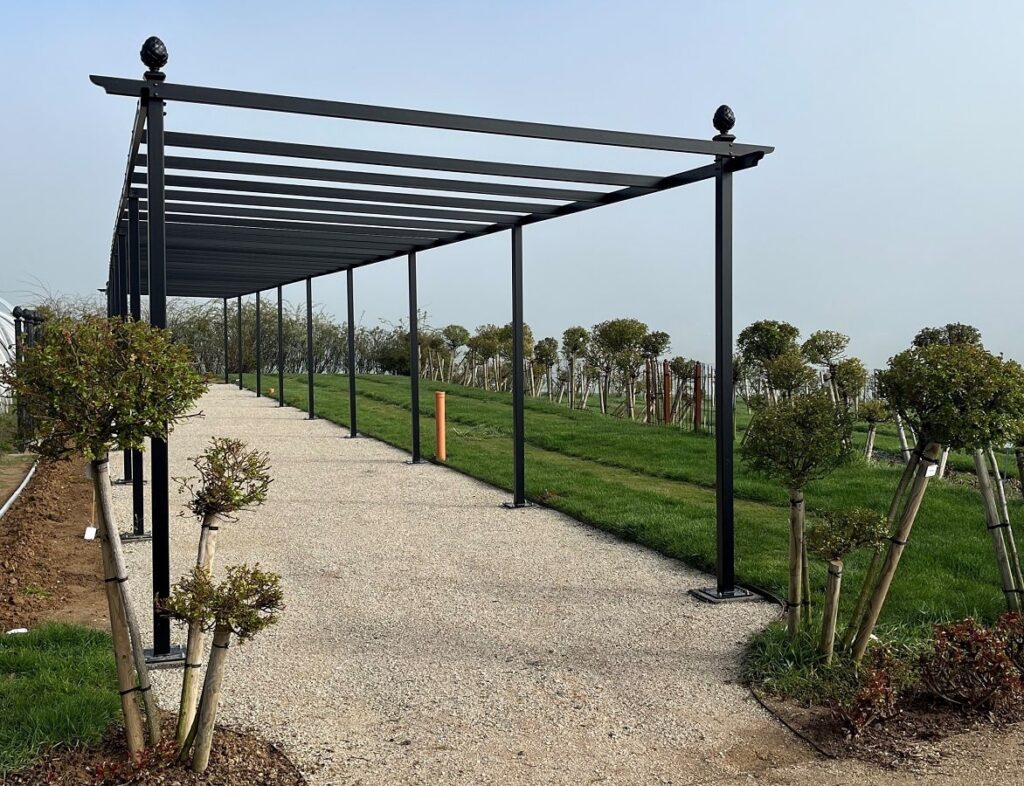
Steel pergolas are the heavyweights on the block. They bring a bold, industrial vibe and can support much heavier loads (think climbing plants, hanging lights, or even your friend’s brilliant idea of an outdoor punching bag).
But—here’s the catch—they can rust. Unless you choose galvanized or powder-coated steel, these pergolas may require more attention and care over time.
Advantages:
- Super sturdy and highly durable
- Ideal for large, heavy-duty designs
- Bold industrial aesthetics
Disadvantages:
- Prone to rust without proper treatment
Aluminum vs Steel Pergolas: In-Depth Comparison
Weight and Installation
Aluminum Pergola:
Aluminum Pergolas are relatively lightweight, easy to transport, and simple to install. They can be seamlessly integrated into existing patios, balconies, or wooden decks without requiring a specialized foundation. Their lighter weight also means lower transportation costs and easier relocation if needed in the future, making them a popular choice among DIY enthusiasts.
Steel Pergola:
Steel pergolas are significantly heavier, requiring reinforced footings and professional installation. Transportation is costlier, and the construction timeline is longer. They are ideal for permanent, large-scale commercial installations but may not be budget-friendly for smaller residential projects.
Maintenance Costs
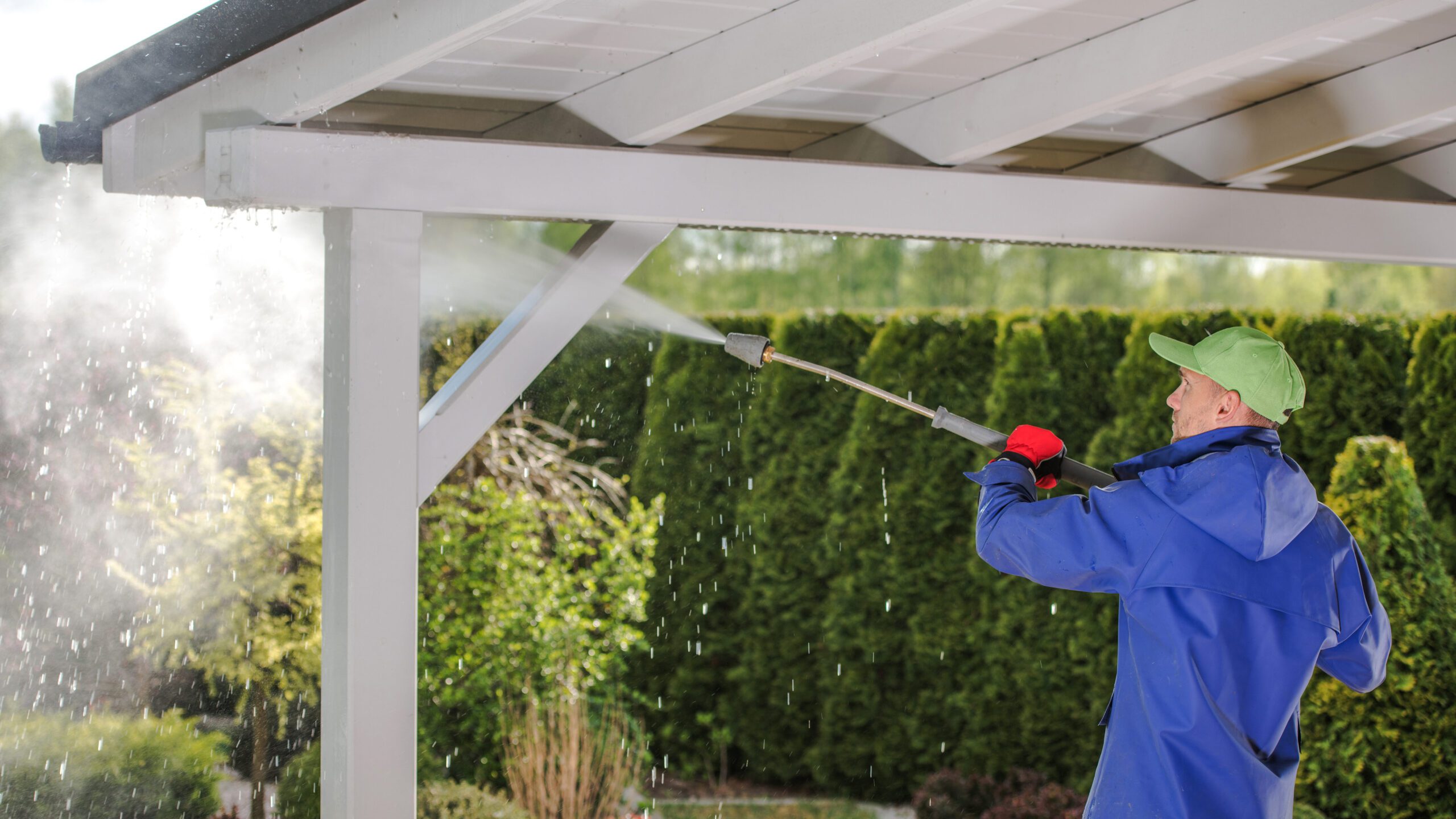
Aluminum Pergola:
Maintenance is a breeze. A quick rinse and occasional wipe-down are usually all that’s needed. The powder-coated finish resists UV damage and color fading, making it nearly maintenance-free for years.
Steel Pergola:
Steel requires regular inspections to check for scratches, chips, or rust spots. If the protective coating is damaged, rust can quickly develop. Over time, repainting or rust prevention treatments may be necessary, increasing long-term maintenance costs.
Corrosion and Weather Resistance
Aluminum Pergola:
Aluminum is naturally rust-proof, making it perfect for coastal, rainy, or humid environments. Whether it’s heavy rain, intense sun, or freezing temperatures, aluminum stays stable and reliable with minimal weather impact.
Steel Pergola:
Without proper galvanization or powder coating, steel pergolas are highly susceptible to rust, especially in high-humidity or salty coastal areas. Even with treatment, scratches can become rust hotspots, requiring timely maintenance to prevent long-term damage.
Cost Comparison
| Item | Aluminum Pergola | Steel Pergola |
|---|---|---|
| Material Cost | ✅ Lower: Aluminum is generally more affordable and budget-friendly. | ❌ Higher: Steel is more expensive, especially for large projects. |
| Transportation Cost | ✅ Lower: Lightweight structure significantly reduces shipping costs. | ❌ Higher: Heavyweight frames lead to higher logistics expenses. |
| Labor Cost | ✅ Lower: Easy to assemble, faster build time, less manpower required. | ❌ Higher: Complex installation, often requires heavy lifting and welding. |
| Installation Time | ✅ Faster: Small projects can be completed in 1-3 days. | ❌ Slower: Longer construction timelines, especially for commercial installations. |
| Maintenance Cost | ✅ Minimal: Corrosion-resistant, almost maintenance-free with occasional cleaning. | ❌ Higher: Prone to rust, requires regular anti-rust treatment, repainting, and structural inspections. |
| Lifespan | ✅ Long: 10-20+ years with proper care. | ✅ Long: Durable structure but heavily reliant on consistent maintenance. |
| Best for | Residential backyards, small commercial patios. | Large commercial spaces, hotels, industrial applications. |
Aluminum Pergola:
Generally more affordable across materials, transportation, and installation. Due to its lightweight nature, it offers quicker build times and lower labor costs, perfect for homeowners seeking budget-friendly, fast installations.
Steel Pergola:
More expensive in materials, shipping, and labor due to its weight and complexity. Best suited for commercial spaces with larger budgets and longer construction timelines.
Safety and Structural Stability
Aluminum Pergola:
Aluminum pergolas are safe for most residential and mid-sized commercial applications. However, in high-wind areas, reinforced designs or additional anchoring are recommended. Many modern aluminum pergolas now feature integrated wind resistance and internal drainage, making them durable under normal weather conditions.
Steel Pergola:
Steel pergolas offer superior structural stability and wind resistance thanks to their weight and sturdiness. They are particularly suited for regions with extreme weather, high winds, or year-round exposure. Steel is often the preferred choice for public spaces, commercial zones, and large-scale permanent installations where safety is the top priority.
Drainage System Comparison
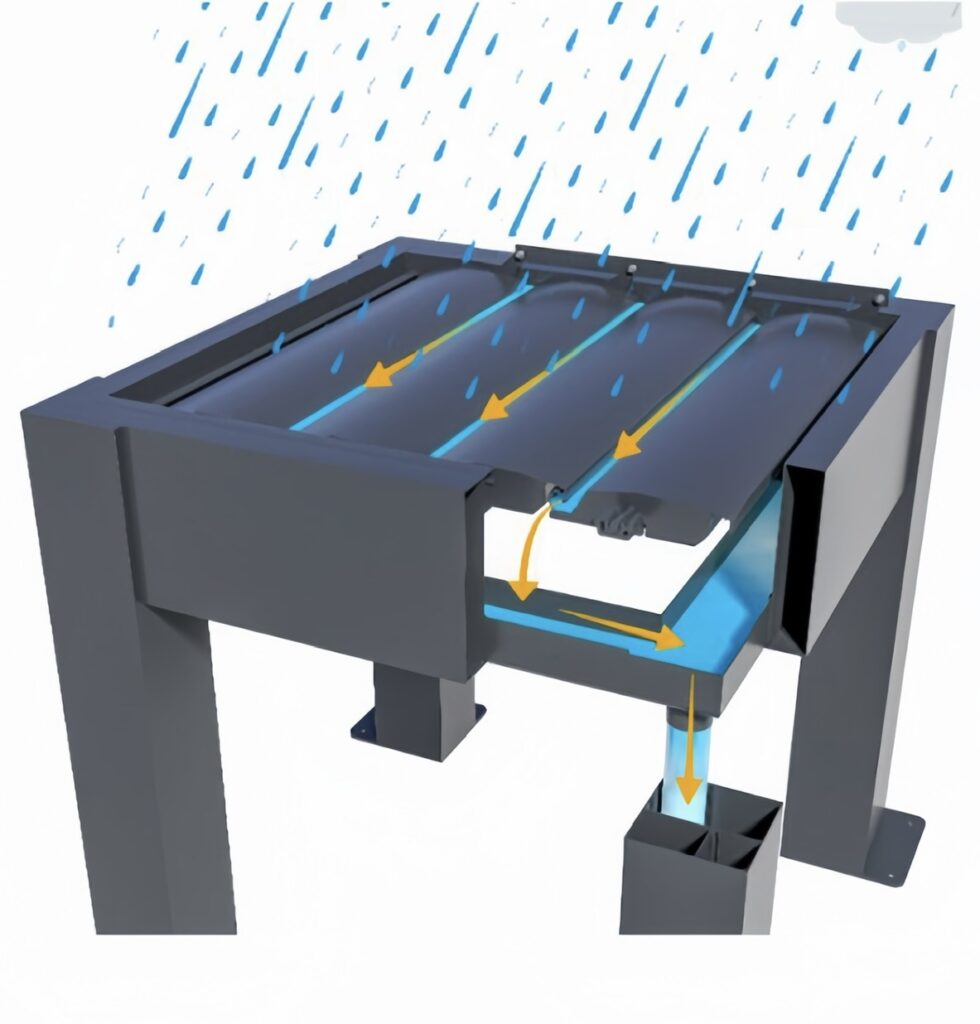
Aluminum Pergola:
High-quality aluminum pergolas typically come with built-in hidden drainage systems that channel rainwater through the internal columns. This design is both practical and visually clean, effectively preventing water pooling.
Steel Pergola:
Steel pergolas usually rely on traditional rooftop drainage with water flowing naturally off the edges. Some high-end models offer hidden drainage, but special attention must be paid to waterproofing joints and connection points to avoid rust from trapped water.
How to Choose?
If your situation is one of the following, I recommend that you choose an aluminum pergola:
- You prefer low-maintenance solutions.
- You live in coastal or rainy regions.
- You love modern, minimalist, smart designs.
- You want fast installation on a reasonable budget.
If your situation is one of the following, I recommend that you choose an steel pergola:
- You need to support heavy plants or equipment.
- You love industrial or vintage aesthetics.
- You live in high-wind or extreme weather areas.
- You’re working with a generous budget and prioritize long-term structural security.
Still can’t decide? Contact us and we’ll help you choose the perfect backyard hero.
FAQ
Do aluminum pergolas rust?
No. Aluminum is naturally rust-resistant and stays in great shape with minimal maintenance.
Are steel pergolas stronger than aluminum?
Yes, steel has higher load-bearing capacity, but aluminum is strong enough for most residential uses.
Which pergola lasts longer?
Aluminum typically offers longer lifespan with less maintenance. Steel can also last decades with proper care, but requires ongoing rust prevention.
Can both pergolas be powder-coated?
Absolutely. Powder coating adds color and extra protection, and is especially important for steel pergolas.
Which is easier to install?
Aluminum is significantly easier to install due to its lighter weight, making it a better option for DIYers. Steel pergolas require professional installation.

